Schlagwort: ‘Bachelor’
That’s the way to study – the rating in the CHE Ranking 2025.

The degree programs at the Faculty of Electrical Engineering and Information Technology received top feedback in Germany’s largest university ranking.
The current CHE ranking confirms that the Bachelor’s degree programmes in Electrical Engineering and Information Technology (with and without an orientation semester) and Computer Engineering are of an excellent standard. Support at the start of studies is rated particularly highly, achieving an impressive result of 15 out of 16 points. According to student feedback, they find the facilities and organisation of their studies excellent. The ranking results show that students preparing to study abroad have very positive experiences with support. The Faculty of Electrical Engineering and Information Technology received positive ratings in the fact check with regard to doctorates per professor and third-party funding per researcher. This indicates a clear focus on science. Students also express above-average satisfaction with the introduction to scientific work.
Once the field of study has been chosen, the question of which university to attend may arise. In addition to the professors’ assessment and the fact-check, this ranking includes first-hand assessments from students for prospective students.
Some of the questions that were rated on a scale of one to five stars were: ‘How broad is the content of the degree programme?’, ‘Can compulsory courses be attended without overlapping?’, and ‘Are the PCs up to date or old-fashioned?’
The CHE ranking is the most comprehensive university ranking in the German-speaking world. More than 300 universities were analysed, and over 120,000 students took part in a survey. Individual universities are compared with each other based on various criteria for each subject, and are then categorised into top, middle or bottom groups. RWTH was ranked in the top group a total of 97 times.
Each subject is analysed every three years. The results for the individual subjects are available at the website CHE Ranking 2025: The Big University Ranking.
I´m gonna be an Engineer – Team HVT
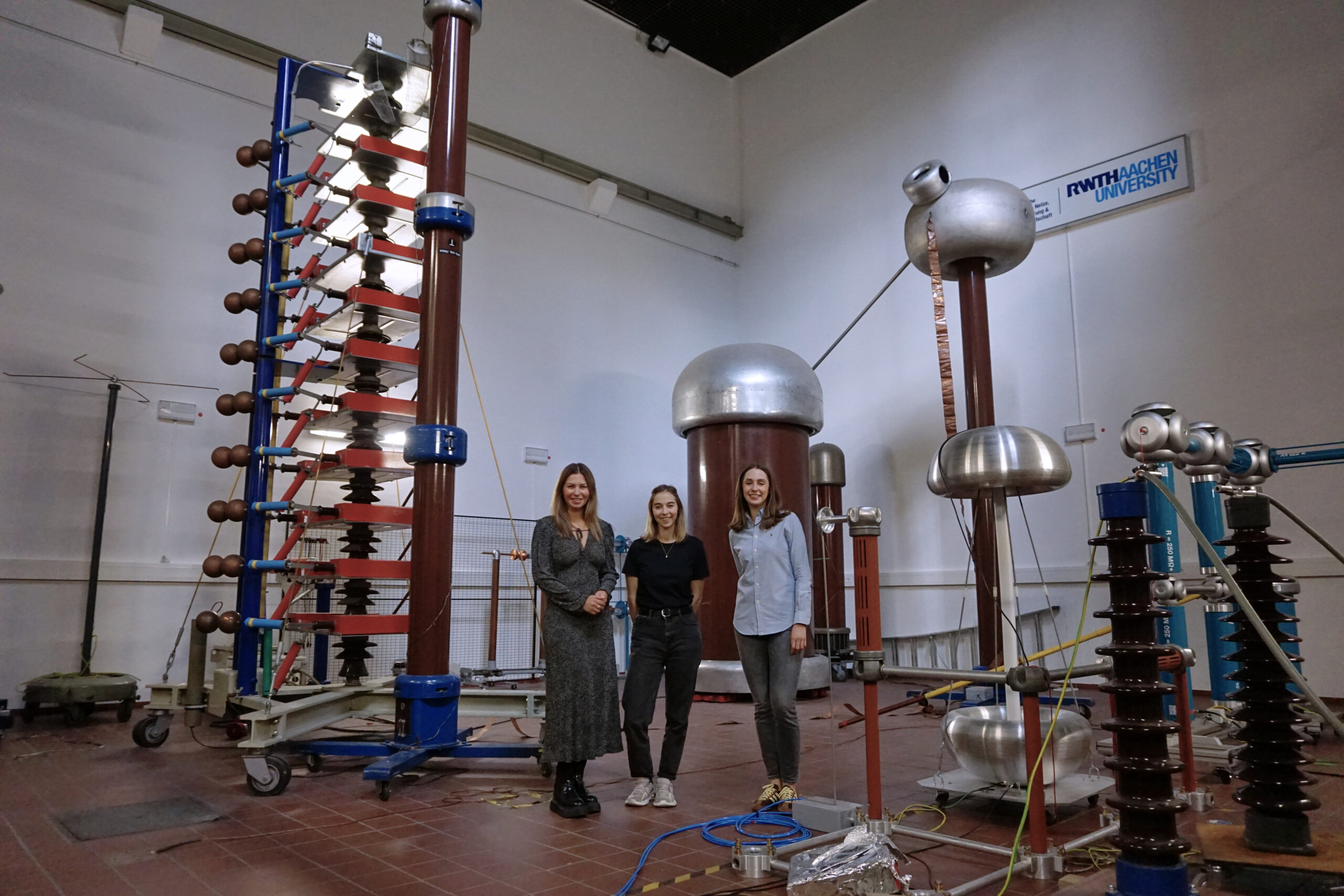
In the field, lightning strikes and other extreme events can push the power infrastructure to its limits. To ensure safe operation, tests can be carried out using high-voltage generators.
The High Voltage Technology (HVT) research and teaching unit is actively involved in developing new solutions for the energy transition. Here, three members of the team give an insight into their day-to-day work.
Through your research, you are committed to pushing the boundaries of innovation in the energy sector. But where did you start? Alexandra, what subjects were you interested in at school and what happened then?
‘My journey into the energy sector began when I was still at school. From an early age, I had a strong interest in scientific subjects, especially physics and mathematics. When I was at school, my secondary school had a direct cooperation programme with the university where I later completed my Bachelor’s degree. As part of this programme, we were able to attend additional courses after school, which allowed us to get to know different aspects and types of STEM subjects better. I had always been fascinated by physics, but I soon realised that I wanted to study engineering. What ultimately led me to electrical engineering was my desire to solve real-world problems and drive innovation.’
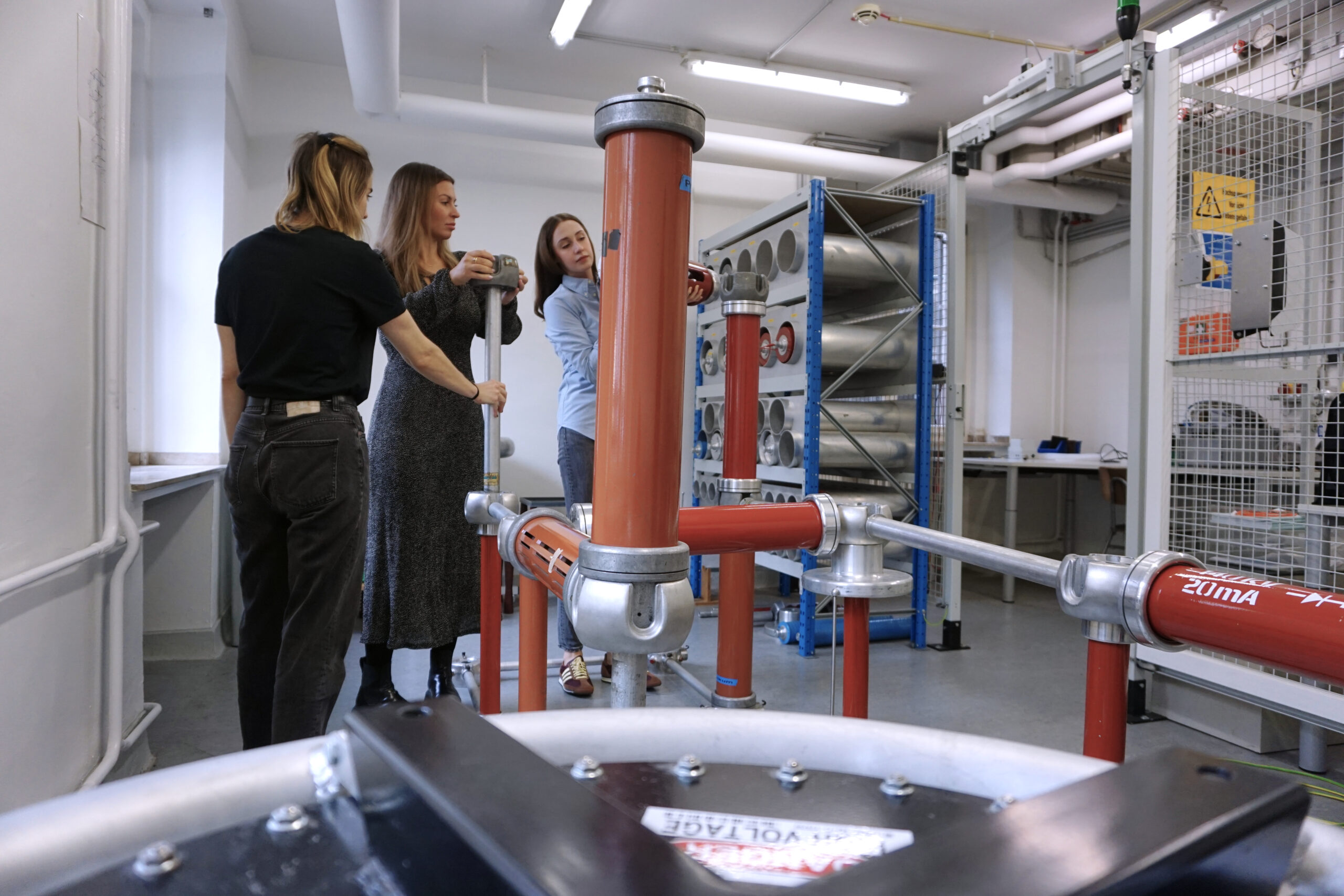
A test bench has been set up for electrical engineering and information technology students to put their theoretical knowledge to the test.
The rapid transformation of the energy system is creating new challenges. Electricity highways such as Südlink and Südostlink will transport electricity from onshore and offshore wind farms from the north to all parts of Germany. They will use high-voltage direct current (HVDC) transmission. You are researching insolation systems under direct current load. What are the advantages of direct current (DC) over alternating current (AC)? And why is a reliable isolation system so important?
‘Projects such as Südlink and Südostlink use high-voltage direct current (HVDC) to transport electricity efficiently over long distances. HVDC has the advantage over alternating current that it offers lower transmission losses, higher transmission capacities and improved grid stability. In addition, HVDC can be easily integrated into existing grids. A reliable insulation system is essential to ensure the safety and efficiency of the entire transmission system. In addition to withstanding the high loads associated with stationary power transmission, the insulation must also be able to withstand short-term transients of overvoltage. The correct functioning of the insulation system is critical to the proper operation of the entire energy system, as critical infrastructure such as power cables, converters and power transformers require a properly functioning insulation system. Our research focuses on optimising these systems to increase the reliability and lifetime of transmission networks, ultimately supporting the energy transition.’
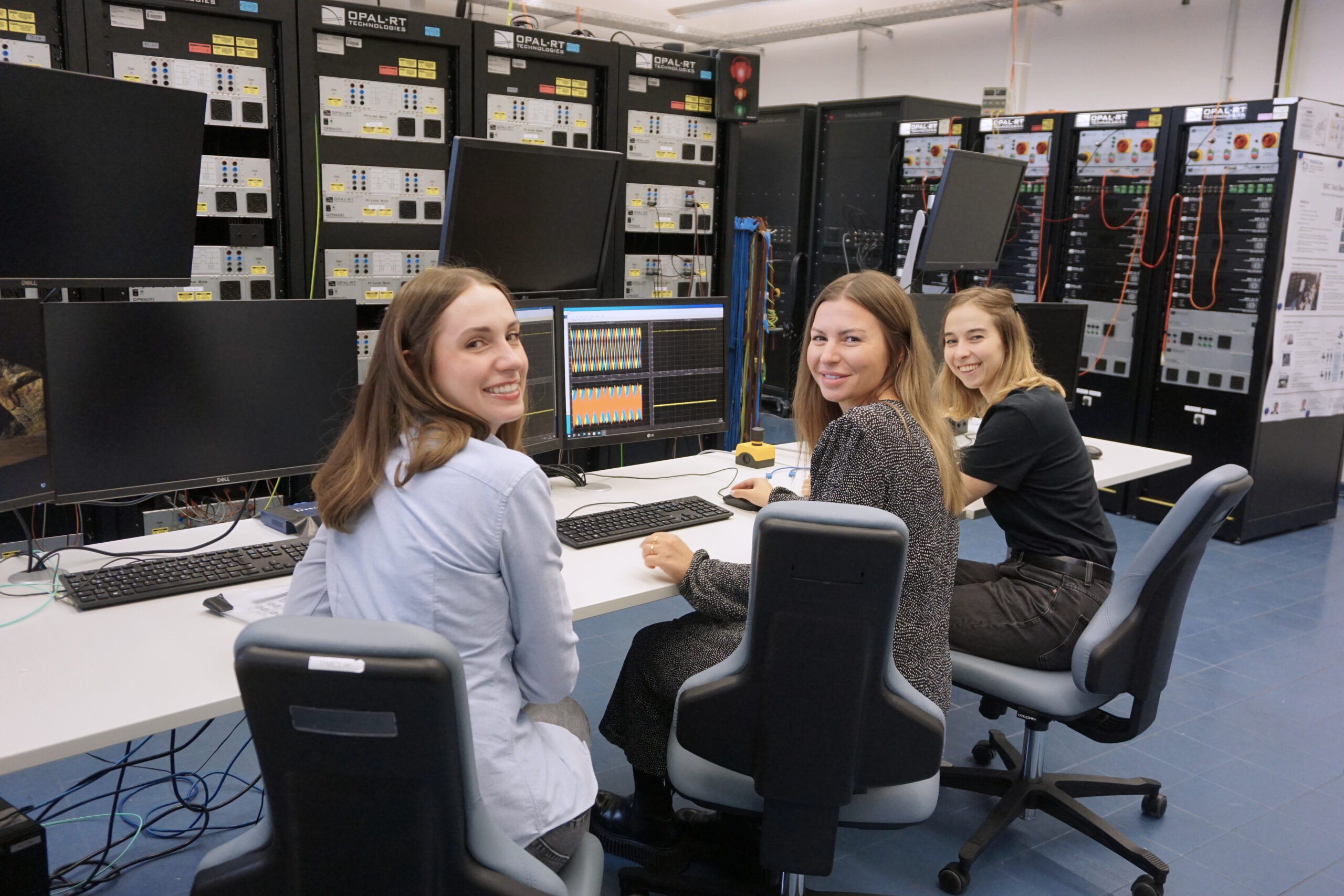
One application for the MMC test bed is the safe and ‘intelligent’ integration of electricity from offshore wind farms into the onshore transmission grid. Eight laboratory-scale modular multilevel converters (MMCs) enable the simulation of different systems and scenarios in real time, making it possible to plan the implementation of the energy transition.
In a vision of the future, we will be driving autonomous cars that we charge with renewable electricity from the ‘smart grid’. From your research perspective, what demands will be placed on the electricity grid? What groundbreaking developments are you working on? And what projects are you most excited about?
‘The electricity grid must meet many requirements to ensure a reliable and efficient supply of energy. In our research area, we work on different aspects of the energy transition, divided into the Insulation Systems, Primary Technology and Diagnostics and DC Systems teams. This allows us to cover both the ‘big picture’ of the grid and the ‘small picture’ of the critical components in the grid. With today’s focus on the new green power system of renewable energy and environmentally friendly circuit breakers, we are working on exciting projects that will enable this transformation. These include DC switches for DC systems and advanced environmentally friendly insulation systems for various applications. Another important aspect of our work is the integration of new technologies into existing systems to ensure a smooth transition. What I find particularly exciting are projects that deal with the further development and adaptation of existing equipment in the context of the energy transition. This work helps to ensure that the existing electricity system continues to operate efficiently and reliably, while at the same time driving the transition to renewable energy and modern technologies.’
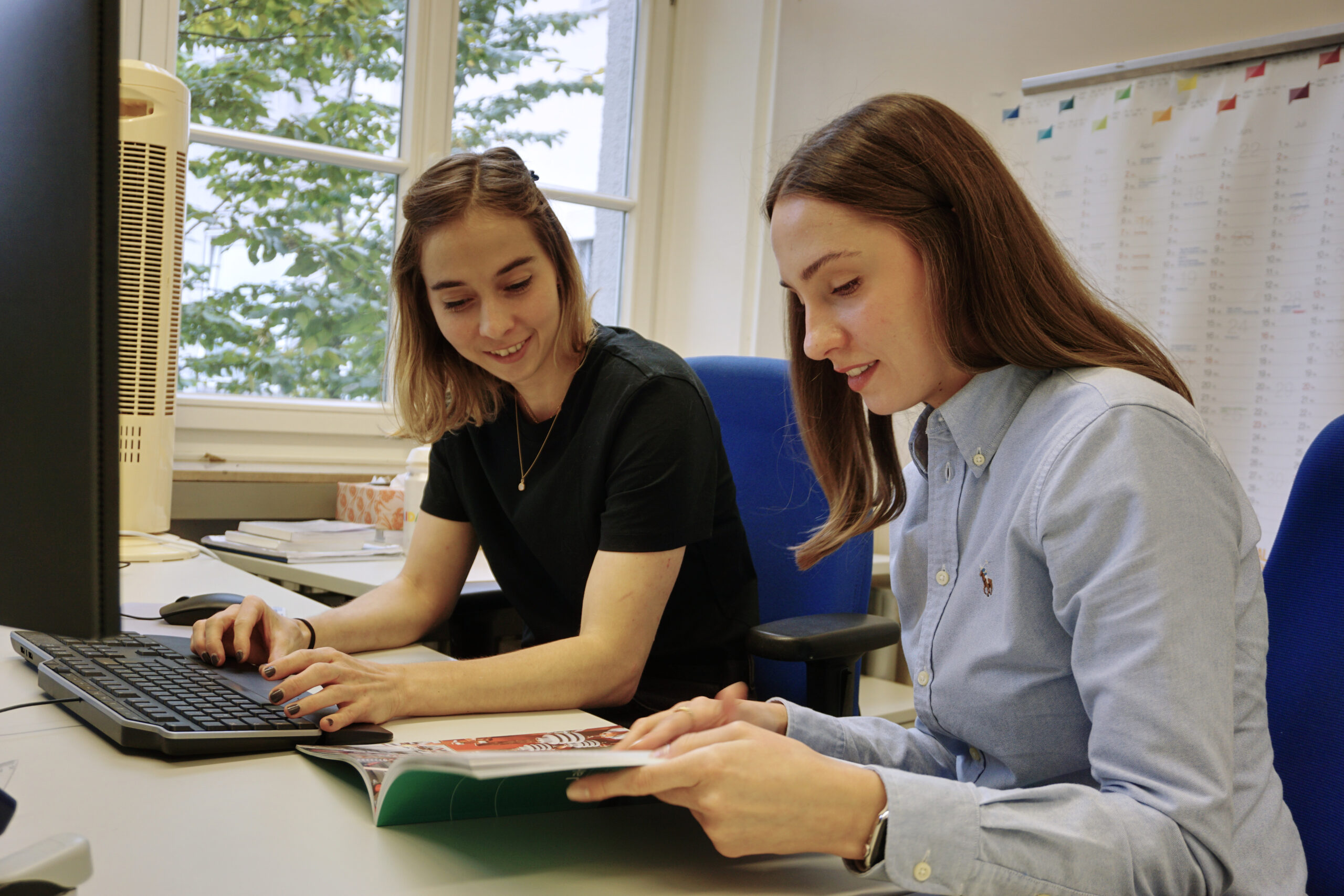
From left: Verena West is researching new types of circuit breakers as components of a meshed AC grid. Aleksandra Wiecha is researching the lifetime of insulation systems in the context of distributed energy generation and supply.
Your research will cover a broad spectrum from modern electrical systems to control and protection concepts for future power grids. You have a state-of-the-art laboratory infrastructure at your disposal. Verena, what is a typical working day like? What other aspects of the job are important? How important is teamwork and other soft skills?
‘In the mornings, I start at least an hour before I start working with the students (final year students and student assistants) in the lab. During this time, I deal with my emails and try to find time to work on my thesis topic. When the students arrive, we go through the plan for the lab day and I give them the go-ahead to start their experiments. Then I go back to my desk and work on various projects, analysing the results of experiments or working on my dissertation. If there are problems in the lab, I help out. Teamwork is very important to me, because you can’t get very far in the lab without working together. The support and guidance from experienced colleagues is very helpful. As the work as a research assistant covers many different topics, the ability to quickly familiarise yourself with new problems is also extremely important, as is good time management.’
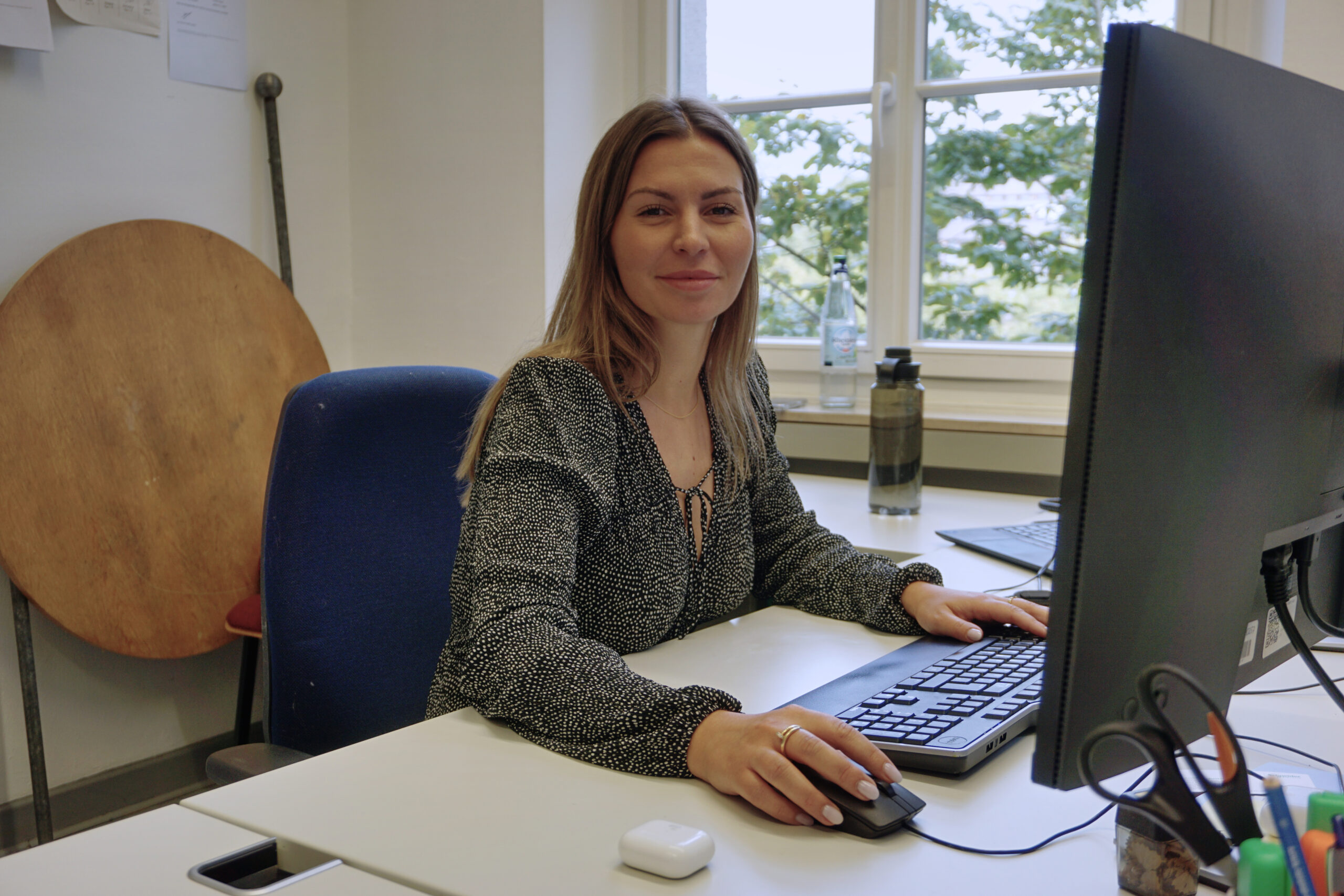
Sarah’s research focuses on the protection of AC lines in the transmission grid as the share of renewable energy increases.
Diversity and equal opportunities are core values in your team. Sarah, what does work-life balance mean to you personally and do you live it?
‘Work-life balance is a popular trend these days. In addition to my professional life, I regularly commute between my home in Bavaria and Aachen. This situation poses a particular challenge when it comes to finding the perfect balance. I have learnt that work-life balance does not necessarily mean an equal division of time between work and private life. It is more about setting priorities and making compromises in order to integrate both areas in the best possible way. It’s important to define what work-life balance means to you individually, rather than following general trends. To balance my professional and personal responsibilities, I rely on clear prioritisation and good organisation. I consciously make time for sport, activities with family and friends, travel and also periods of rest to ensure a sustainable balance. The support of my environment plays an important role in this. Of course, there are periods when one area requires more attention than the other, but overall I always strive for balance.’
Be inspired and find your own way!
On our website we inform you about our study programmes.
A work of possibilities – Team AEV
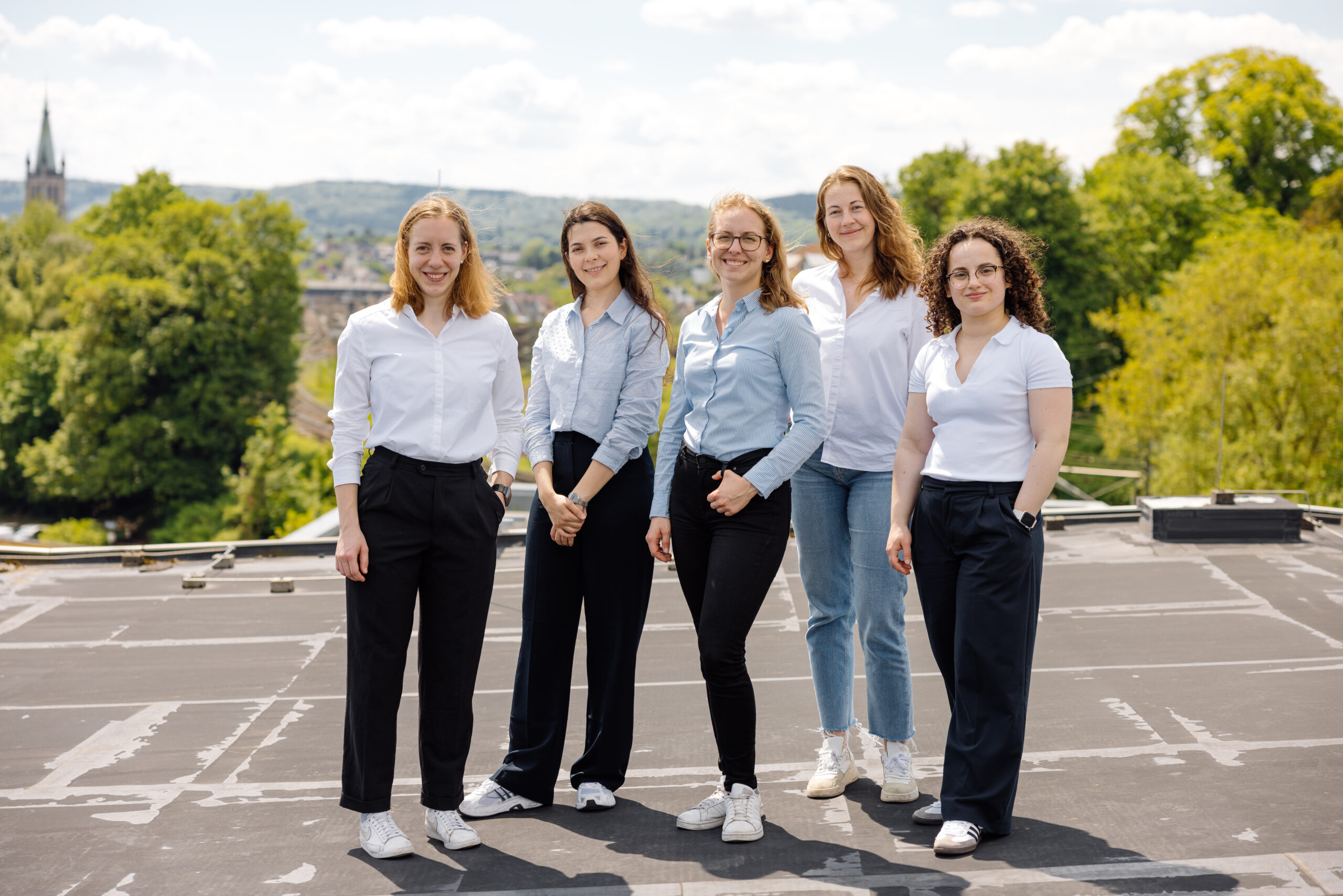
From the left: Almut Herzog, Sarra Bouchkati, Irina Zettl, Franziska Tischbein, Antigona Selimaj © Martin Braun
The Chair of Active Energy Distribution Grids at the Institute of High Voltage Equipment and Grids, Digitalization and Energy Economics (IAEW) currently employs five female researchers who demonstrate how varied and exciting a technical degree and subsequent doctorate can be.
Each has a unique educational background – from electrical and industrial engineering to physics and computer science. What they all have in common is a shared motivation: A passion for science and a desire to shape the future through technological innovation. Their topics range from the design of protection systems and cybersecurity to the use of AI in network operations. Whether simulating on the computer or experimenting in the lab, each contributes their unique knowledge and can build new expertise in previously unknown areas.
Antigona, team leader of the Resilient Grid Control Technology group, explains her motivation for studying industrial engineering with a focus on electrical engineering:
„Even at school, I was very interested in maths and physics. I was also fascinated by electrical engineering as a branch of physics, and I thought that combining it with business administration would open up excellent career opportunities.“
STEM professions are not only in high demand in many sectors, they also offer excellent career prospects. The high need for skilled professionals ensures job security and stable career prospects. These professions also open up international opportunities, whether through projects abroad or working in international teams.

Making a social contribution to the energy transition is now particularly important to Antigona. In this respect, she feels it is her responsibility to act as a role model for young women who also want to pursue a career in STEM professions:
„I would like to set a good example and encourage young women to develop their own potential.”
When it comes to doctorates, everyone agrees that they allow you to constantly learn new things and develop yourself. In addition to personal growth, this position would offer the opportunity to play an active role in shaping social development. Being active in research would therefore mean to work on precisely those projects that have the potential for meaningful change.
„Doctoral studies allow us to work on cutting-edge technological and scientific innovations,” explains Antigona.
The work of the Chair of Active Energy Distribution Networks is characterised by a wide variety of projects carried out with both research and industrial partners. There are simulative projects, where computer models are used to analyse and predict complex systems, and laboratory-based projects, where practical experiments and physical tests are carried out on energy systems.
The research projects are often closely linked to the doctoral topics of the staff and lead to the publication of research results in renowned scientific publications. The exchange with other research institutions and universities promotes an intensive scientific discourse and contributes to the further development of the projects. In addition, participation in international conferences offers the opportunity to present research results to a wide audience and to gain new insights.
Industrial projects at the IAEW are a unique opportunity to actively participate in the strategic decisions and innovation processes of companies. These projects enable staff to gain relevant practical experience during their doctorate and to make a significant impact at an early stage. By working directly with industry partners, they not only enhance their technical expertise, but also develop important project management and strategic planning skills. They can also build a strong network of industry partners during their time at university.

In addition, a doctoral degree offers a wide range of opportunities for personal and professional development. By taking on new positions within the Institute, employees can strengthen and expand their leadership skills. This experience is crucial for a successful career in industry and prepares them for future leadership roles.
Be inspired and find your own way!
On our website we inform you about our study programmes.
Otto Junker Prizes 2024
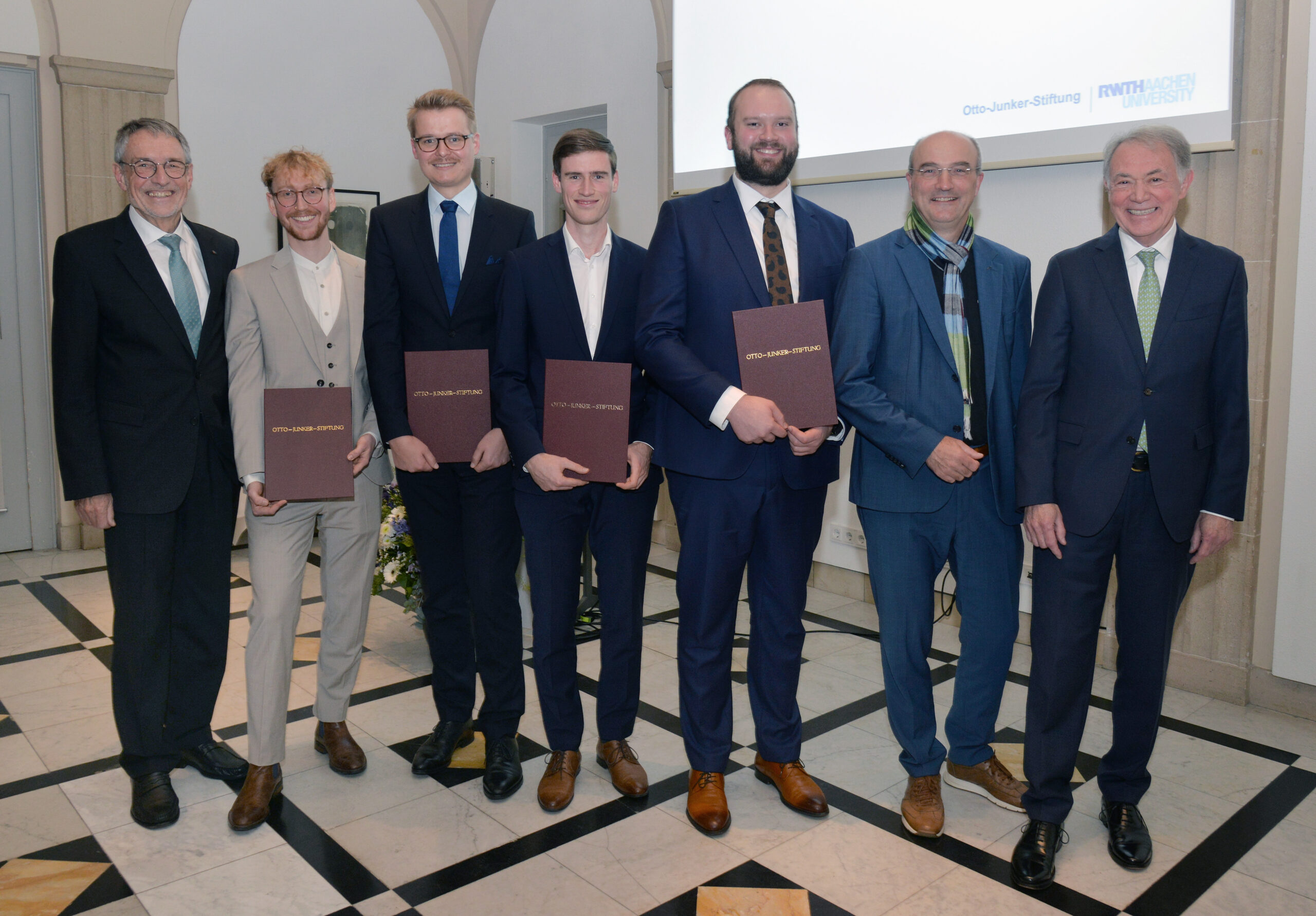
Wolfgang Bleck (on the left), Udo von Berg (on the right) and Ulrich Rüdiger (second from right) extended their congratulations to the award winners Jan Krusenbaum (second from left), Gerrit Ipers (third from left), Daniel Baggen (fourth from left) and Moritz Diewald (third from right). ©Andreas Schmitter
At this year’s Otto Junker Award ceremony, two outstanding young talents, Daniel Baggen and Gerrit Ipers, from the Faculty of Electrical Engineering and Information Technology, were honoured for their outstanding academic achievements.
Daniel Baggen, born in Aachen in 2000, commenced the Bachelor’s degree programme in Electrical Engineering, Information Technology and Computer Engineering at RWTH Aachen University following the completion of his Abitur at Städtisches Gymnasium Herzogenrath. He completed his Master’s degree with a thesis on “the design and commissioning of a highly integrated DC-DC converter for the production of green hydrogen” at the Institute for Power Electronics and Electrical Drives under the supervision of Professor Rik W. De Doncker. Since November 2023, Baggen has been working as a doctoral student in the field of power electronics.
Gerrit Ipers, aged 27, was born in Viersen. Subsequent to his graduation from the Liebfrauenschule Mülhausen in Grefrath, he first completed a Bachelor’s and thereafter a Master’s degree in industrial engineering, with a specialisation in electrical power engineering, at the RWTH Aachen University. He authored his master’s thesis, entitled “Rapid Prediction of Electro-Chemo-Mechanical Degradation of Li-Ion Batteries for End-of-Life Options”, at the Massachusetts Institute of Technology in the USA. Prior to this, he completed the T.I.M.E. double master’s programme at the KTH Royal Institute of Technology in Stockholm. He was supervised by Professor Dirk Uwe Sauer, also from the Institute for Power Electronics and Electrical Drives at RWTH Aachen University. Since May 2023, Ipers has been employed as a technical project manager at a Swedish automotive supplier.
Moritz Diewald, from the Department of Materials Science and Engineering in the Faculty of Georesources and Materials Engineering, impressed the jury with his Master’s thesis, in which he investigated sub-stoichiometric combustion as part of multi-stage flameless oxidation, using both numerical and experimental techniques. In the same department, Jan Krusenbaum was honoured for his Master’s thesis entitled “Thermal conditioning of Li-ion battery shredders as part of a novel recycling process: Effects of the process gas atmosphere and other determinants on the recovery of the critical element lithium”.
The awards were bestowed at a celebratory ceremony. Udo von Berg, Chairman of the Otto Junker Foundation, and Ulrich Rüdiger, Rector of RWTH Aachen University, presented the awards. Professor Wolfgang Bleck, who holds the title of Professor Emeritus and serves as Chairman of the Foundation’s Scientific Advisory Board, extended congratulations on the occasion.
The awards, which are named in honour of the foundation’s founder, Dr. Otto Junker, are bestowed annually upon the most distinguished graduates of the Faculty of Electrical Engineering and Information Technology and the Materials Science and Engineering Group, which is part of the Faculty of Georesources and Materials Engineering. The foundation, which was established in 1970, is dedicated to the advancement of young scientists and provides substantial support for a multitude of individual research projects.
The exceptional accomplishments of these four graduates not only exemplify their individual excellence but also reflect positively on RWTH Aachen University as an institution of higher educations that nurtures outstanding individuals. We would like to extend our sincerest congratulations to Daniel Baggen, Gerrit Ipers, Moritz Diewald and Jan Krusenbaum on this well-deserved recognition. We wish them continued success in their promising careers.
Day of Electrical Engineering and Information Technology 2024
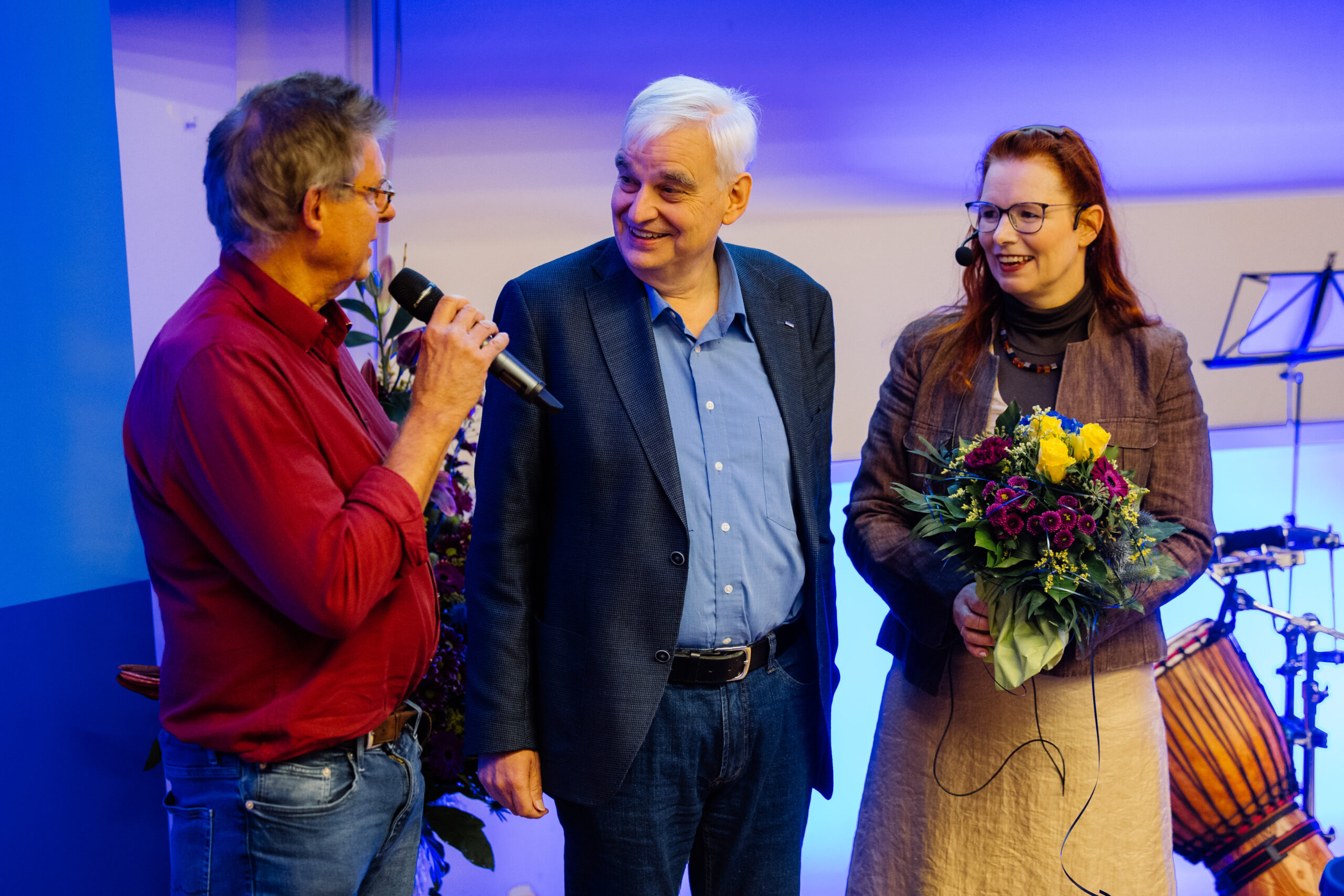
After five and a half years in the role of Dean of the Faculty of Electrical Engineering and Information Technology, Professor Jens-Rainer Ohm (left) was given a ceremonial farewell. The farewell was given by Managing Director Martina Dahm (right) and the new Dean of the Faculty, Professor Albert Moser (centre). © Martin Braun
On the 25th Day of Electrical Engineering and Information Technology (TDEI), which took place on 22 November 2024, we presented our success this year and once again brought together companies, students, faculty members and graduates.
The Faculty of Electrical Engineering and Information Technology at RWTH Aachen University has a longstanding reputation as an institution that produces highly qualified and responsible engineers, a reputation that has been established over the course of five decades. This is corroborated by the faculty’s consistent performance in national and international rankings, in which it consistently ranks at the top. The Dean of the Faculty, Professor Albert Moser, commenced proceedings at the Electrical Engineering and Information Technology Day with a review of the preceding year and the welcoming of new professors to the Faculty team.
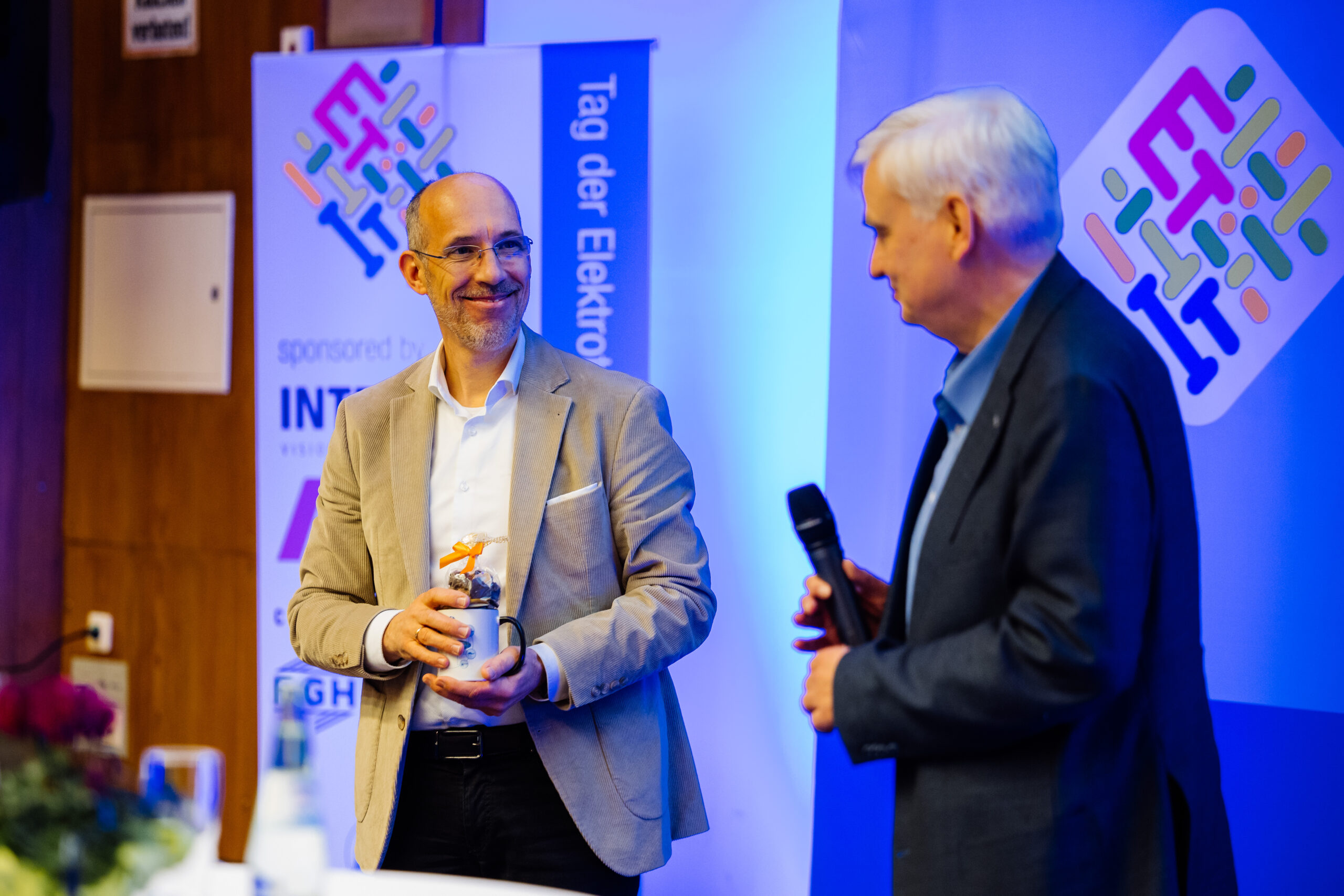
From right: Professor Alber Moser with Professor Volkmar Schulz © Martin Braun
Professor Volkmar Schulz’s expertise in the field of image processing enriches the research in biomedical engineering. He previously led the “Physics of Molecular Imaging” group at the Institute for Experimental Molecular Imaging and is now the head of the Institute of Imaging and Computer Vision at the Faculty of Electrical Engineering and Information Technology, a role he assumed in September 2024.
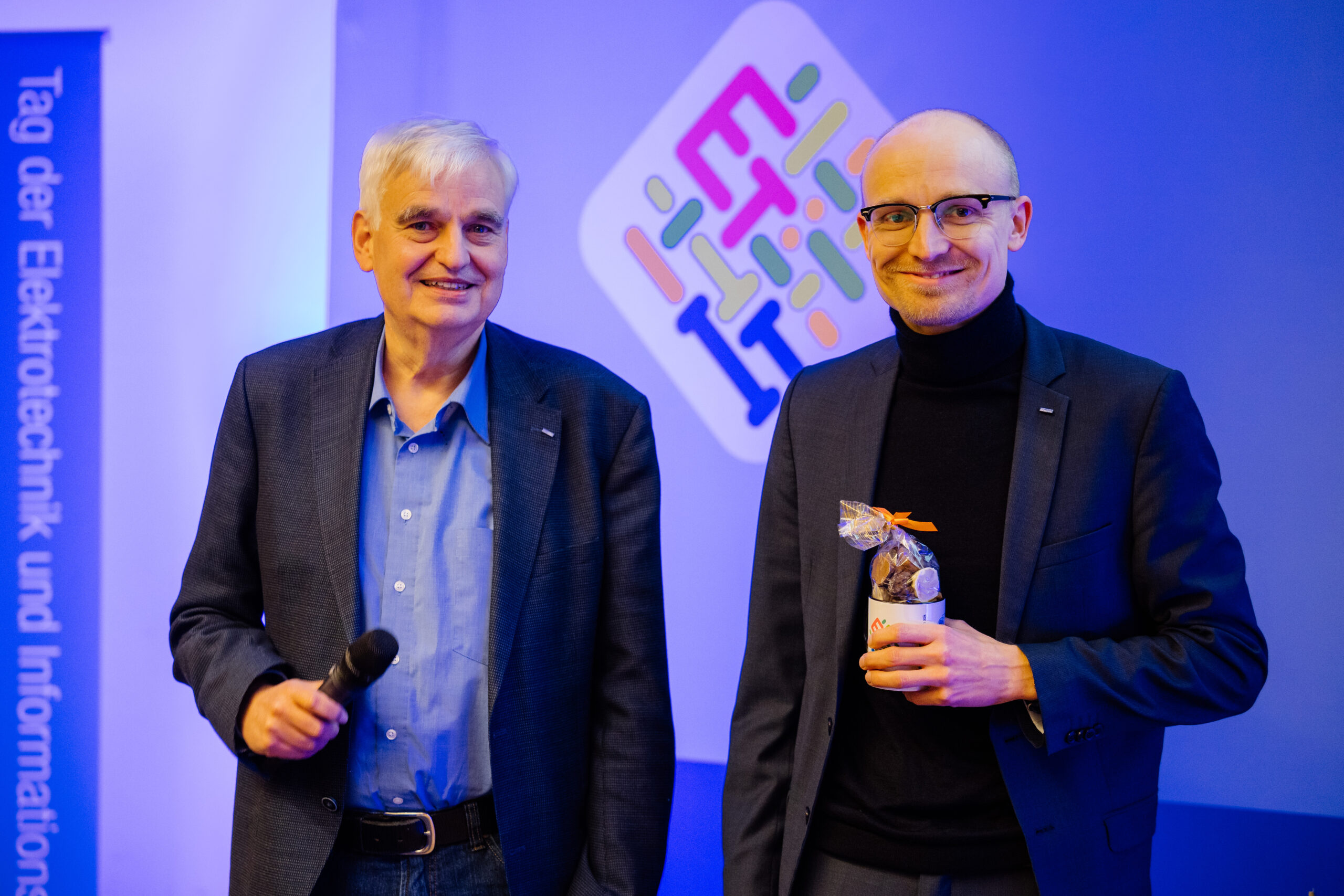
From right: Professor Simon Steentjes and Professor Albert Moser © Martin Braun
Professor Simon Steentjes had been pursuing the objective of returning to RWTH Aachen University for a considerable period of time, as part of his personal mission.
„Working with young minds fosters fresh ideas that keep me attuned to current developments. It’s wonderful being back in teaching“, says Professor Steentjes, who assumed the role of head of the Institute of Electrical Machines and Chair in Electromagnetic Energy Conversion in October.
Having previously held leading positions at Audi AG and the Hilti Group, Professor Steentjes has many years of experience in the industry.
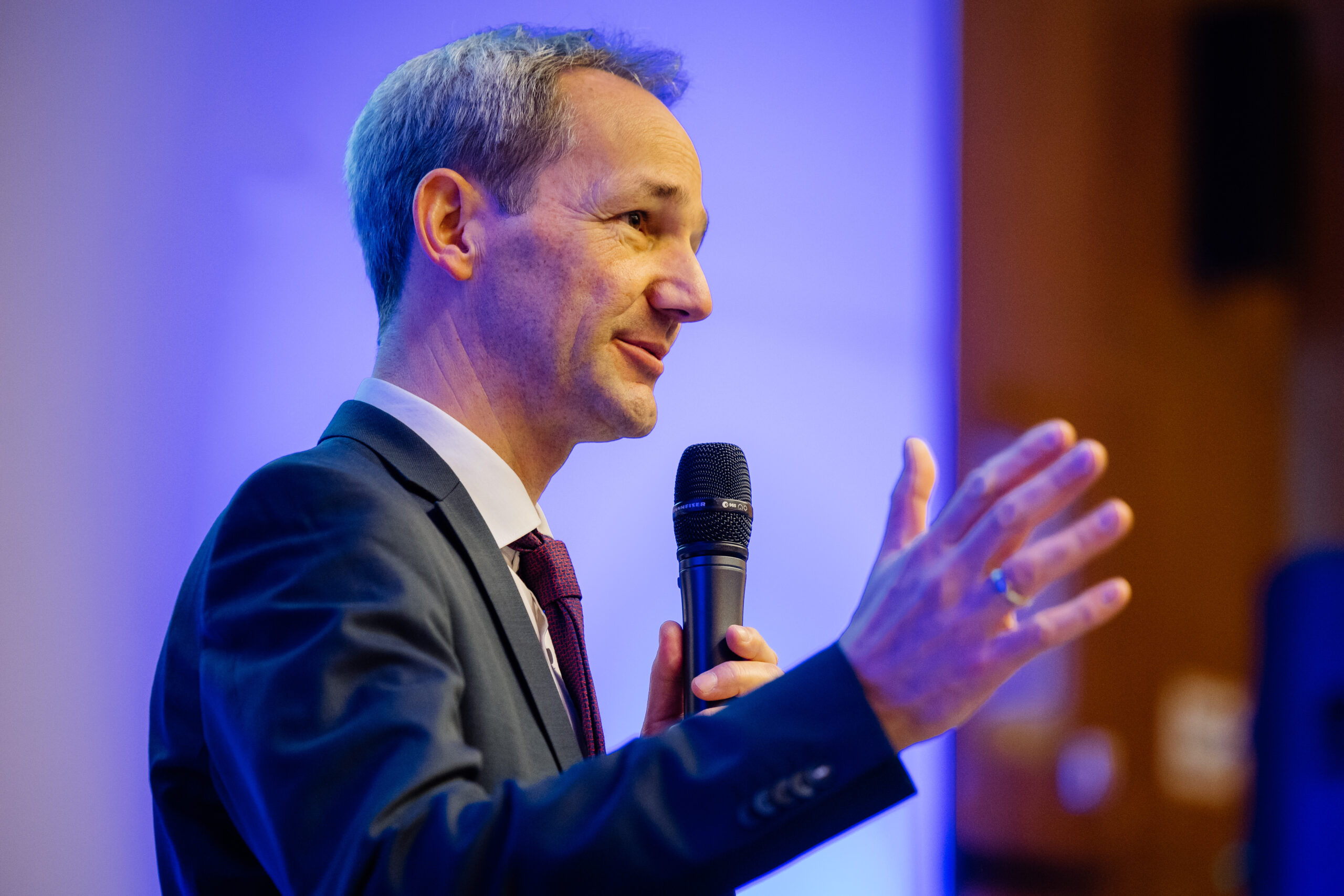
Professor Peter Jax © Martin Braun
Another item on the programme was the report presented by the Dean of Studies, Professor Peter Jax, who is also the Head of the Institute of Communication Systems. Based on the results of quantitative surveys, he conducted an analysis of the academic teaching provided within the degree programmes offered by the faculty, identifying potential areas for further development.
Subsequently, Professor Jax presented the Team Award, which was bestowed upon Cinar Algül, Maxim Klosa and Wenjie Zeng for their exemplary contributions. The three students had demonstrated outstanding performance in their work on the Electrical Engineering and Information Technology project, entitled MATLAB meets Lego Mindstorms.
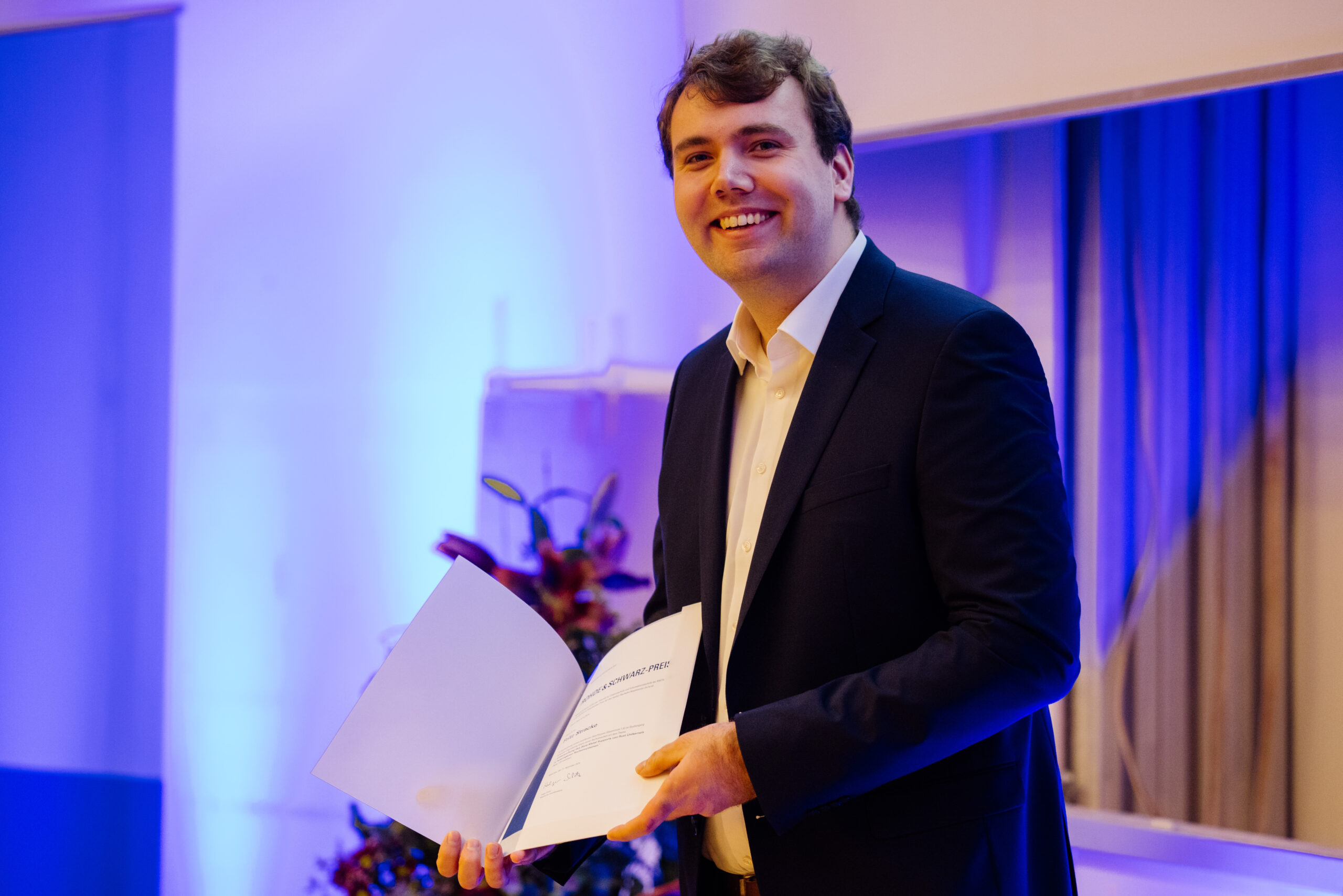
Best Bachelor Award winner Fritz Stracke © Martin Braun
One of the key factors contributing to success is the constructive collaboration with other companies, which provides students with the opportunity to engage in and contribute to challenging projects and theses. At the TDEI event, Gold sponsor Intravis participated in an interview. Furthermore, the Rohde & Schwarz Best Bachelor Award was bestowed upon Fritz Stracke in the current academic year. The student, who is also distinguished by his dedication to the student council for electrical engineering and information technology, was recognized for his bachelor’s thesis, entitled “Investigation of the bare-metal support of Rst Unikernels in heterogeneous computing systems”.
Another noteworthy feature of the event was the keynote address delivered by Professor Andreas Hierlemann from ETH Zurich, entitled “Interfacing with brain cells at subcellular resolution”. The interview with Professor Sven Ingebrandt, Head of the Institute of Materials in Electrical Engineering 1 at RWTH Aachen University, and the presentation of the key visual and the institute’s projects also provided valuable insights.
The graduation ceremony marked the traditional conclusion of the event. After the graduates were introduced by name on stage, the Dean congratulated each of them on their academic success.
Professor Antonello Monti expressed his gratitude to the students in a unique manner. He once caused a great deal of excitement at the TDEI 2019 with a surprise performance. In the current year, he reappeared on the stage in the company of the ERC Band. Two musical compositions, “Knockin on E.ON’s Door” and “AC to Hell”, were presented as part of the performance.
We would like to express our gratitude to all faculty members and assistants, as well as the RWTH International Academy, for their contributions to the organisation and implementation of the Electrical Engineering and Information Technology Day.
Further details regarding TDEI 2024, along with photographic documentation of the event, can be accessed on the official website.
Who run the work? – Team ÜEW
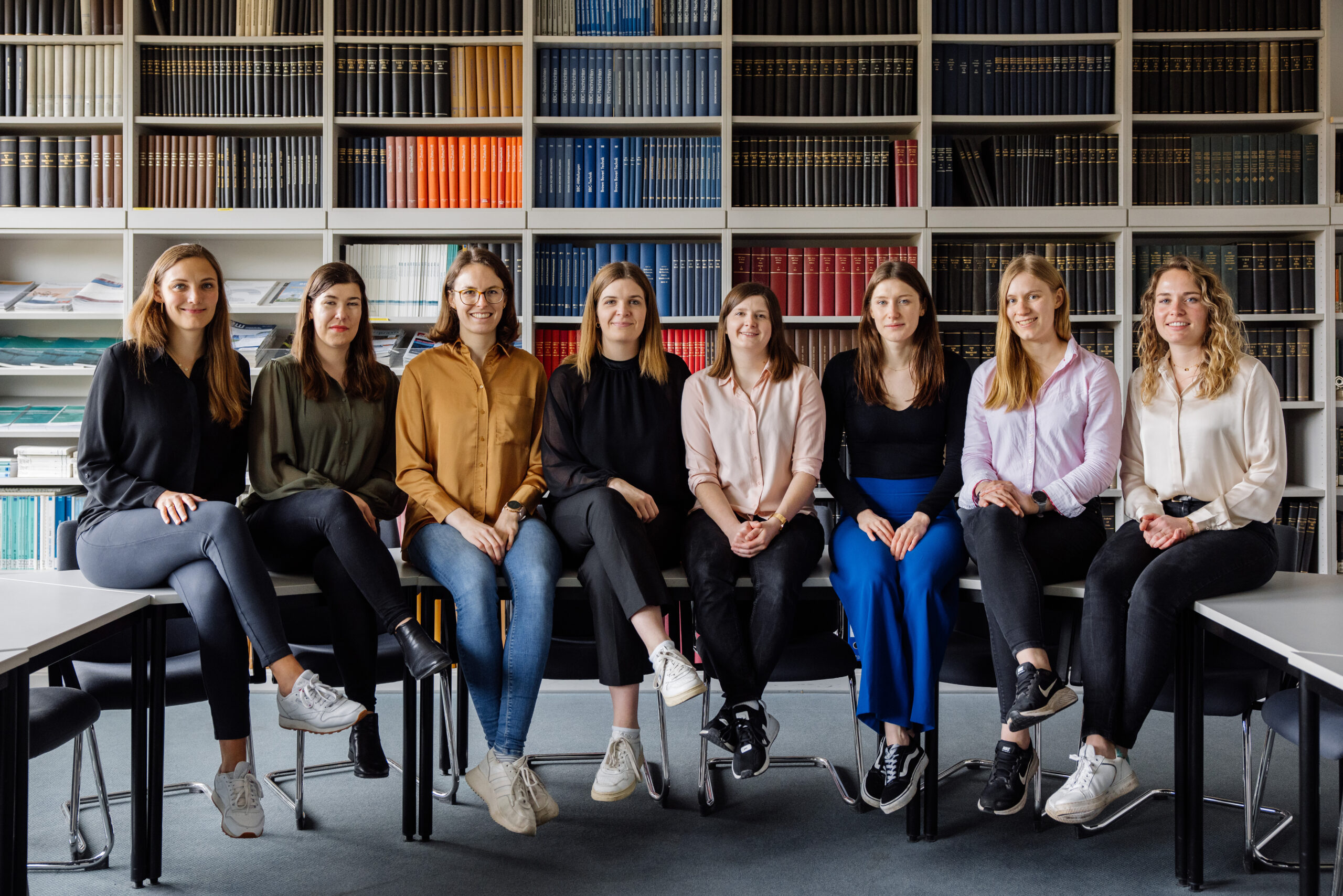
From left: Stefanie Samaan, Ricarda Kriete, Carolin Guntermann, Sophia Tepe, Lina Fischer, Muriel Krüger, Jana Einsiedle, Claire Lambriex ©Martin Braun
A look at the team from the chair of Transmission Grids and Energy Economics at the Institute of High Voltage Equipment and Grids, Digitalization and Energy Economics (IAEW) presents a pleasing picture for the field of electrical engineering: almost a third of its researchers are female.
The share of women in engineering has increased in recent years, and female engineers are a natural part of an institute team. All of the female researchers in the team have completed a degree in the field of electrical engineering and then decided to complete a doctorate at the university and start their professional career here. Of course, working in electrical engineering requires a certain interest in science and technology, but the key to success and fun is usually the curiosity to understand new things.
We are always motivated by the question: ‘How does this work?’, says Lina Fischer, who is researching a robust planning model for the future energy system.
The next step is simply to have the bravery to actively pursue these questions – even if it means venturing into the unknown.
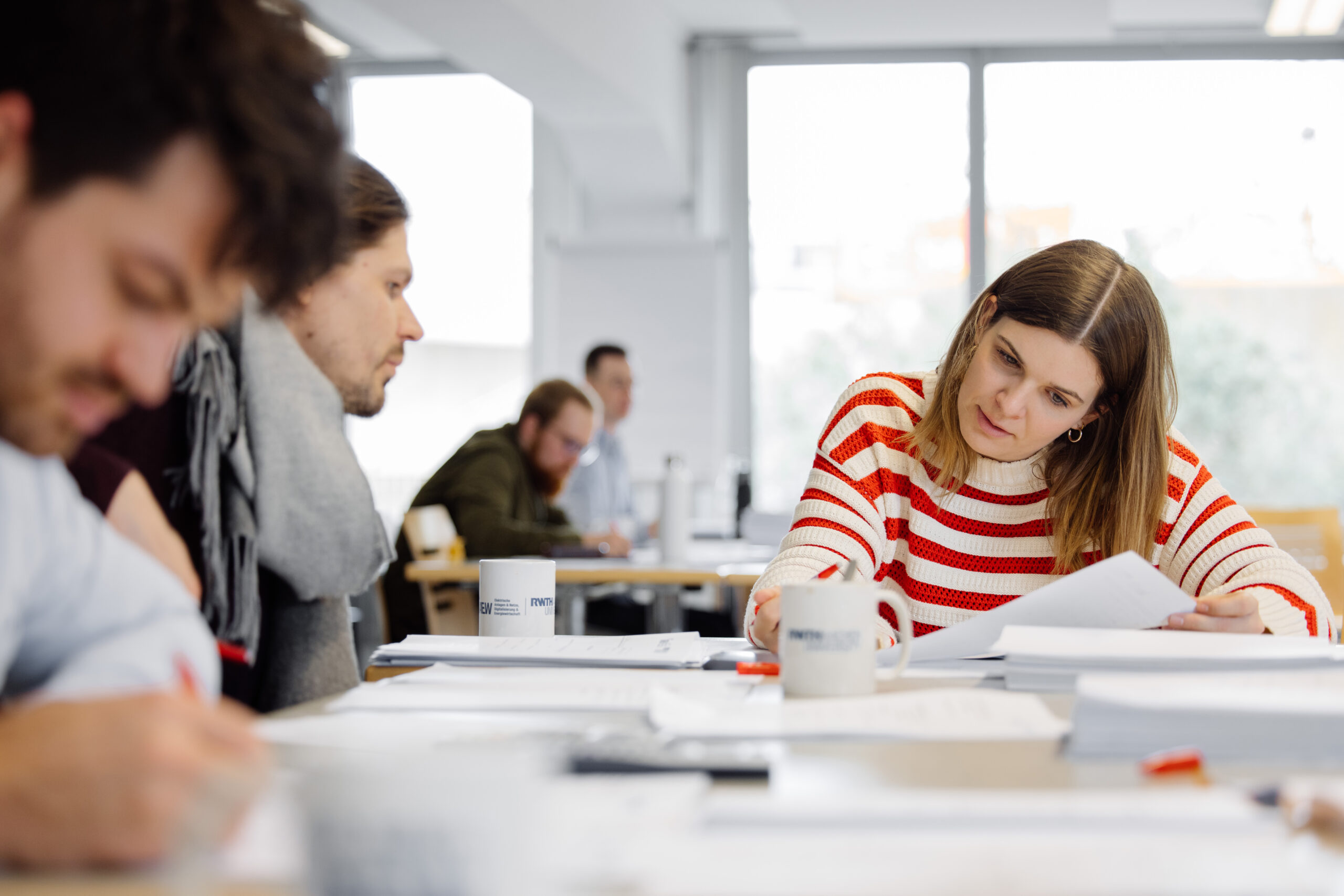
© Martin Braun
Everyone at the IAEW is driven by the vision of researching and developing solutions for the energy transition. The work at the chair of Transmission Grids and Energy Economics is primarily focusing the question:
„How should we design the future energy system so that it is environmentally friendly, reliable and economically efficient?“
This covers a wide range of interesting aspects. For example, lot of research is done on how the large amounts of energy from photovoltaic and wind energy plants, as well as alternative energy sources such as hydrogen, can be integrated into the current energy system. The transmission grid for electricity is essential for this. It can be seen in everyday life, for example, by the high-voltage power lines running alongside the freeways. The transmission grid enables electricity transport over long distances and thus the transport of large amounts of energy from wind turbines in northern Germany to regions with high electricity consumption. Current projects at the chair are investigating how the transmission grid needs to be expanded and operated in the future in order to facilitate the energy transition. Research is also ongoing in determining the locations where power lines to offshore wind turbines in the North and Baltic Seas should be connected to the grid or where large electrolysis plants for the production of hydrogen should be positioned. In addition to the technical aspects of the components, these studies must also take economic aspects into account, such as the costs arising from investments or possible congestions in the transmission grid.
In general, the consideration of economic and market aspects plays a major role in the transformation of the energy system. European efforts to further strengthen electricity trading between the individual countries are leading to increasing electricity exchanges in Europe and thus to further challenges for the transmission grid. The chair is therefore developing methods and models to simulate the European electricity markets. In this way, various future developments can be examined and their potential impact on market participants and the transmission grid can be analyzed.
A further focus of the chair is to deal with innovative concepts that will ensure the secure and reliable operation of transmission grids in the future and thus protect against blackouts. To this end, models and processes must be developed that can represent and investigate the dynamic system behavior of transmission grids and their components under changing conditions.
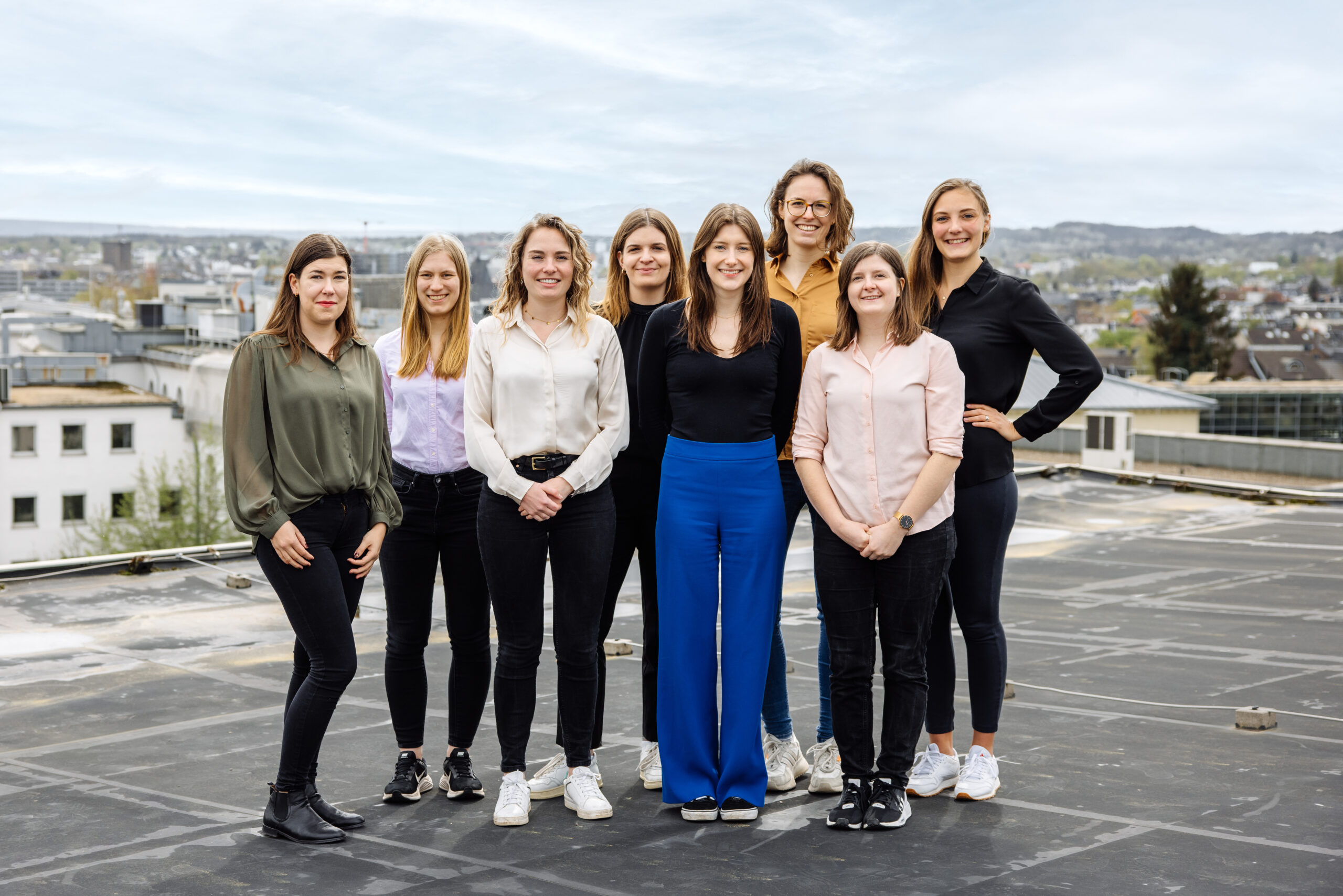
© Martin Braun
When you think of working at a university institute, your first thoughts usually revolve around working solely on your own research project. This often gives a false impression of work life at an institute, especially in the field of engineering. Work at the IAEW is characterized above all by the variety of different projects with both research and industrial partners. This allows you to get to know different topics and to gain a wide range of experience. You are often involved from the very beginning of the projects through working on them on to the presentation of the results. The different project teams make the collaboration very varied. In addition to scientific knowledge, your time at the institute gives you the opportunity to acquire a range of skills that qualify you for management positions in the industry.
Of course, you also experience many other things that make working at the institute worthwhile.
“In particular, the joint activities with other young colleagues after work, various institute traditions, parties and sporting events are all part of it.”
Notably, the IAEW also offers the opportunity to gain insight into the institute and its research topics through student assistant jobs or a thesis.
Be inspired and find your own way!
On our website we inform you about our study programmes.




